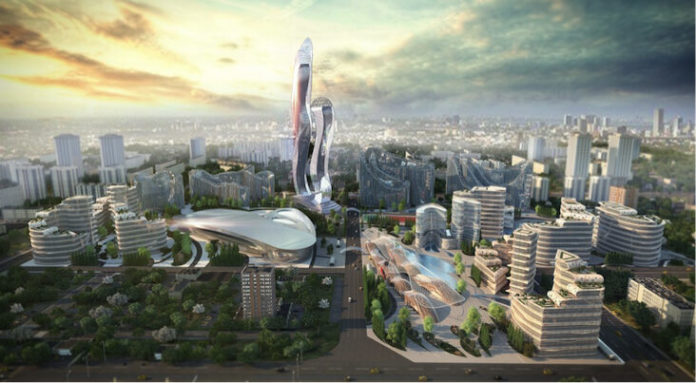Africa’s future is urban. Rising population growth and rapid urbanisation are both contributing to the rise of mega cities on the continent.
- By 2050, Africa will be home to 10 mega cities with 156 million residents.
- Similarly, by 2050, Africa’s total population will double and the global share of African urban residents will grow to 20.2% up from 11.2% in 2010.
- Because cities are centres of commercial activity, 18 major African cities will have a combined spending power of $1.3 trillion over the next decade. In fact, mega cities are expected to drive 15% of the world’s GDP.
It is therefore no surprise that African investors and policymakers are gradually recognizing the economic power of cities and ramping up investments in new city developments.
As these projects emerge, here are three key trends that will shape the future of Africa’s new cities.
1. Private developers will largely fund new cities
Total investment in African new cities is almost $115bn, with the majority of investment coming from the private sector. Over 75% of new cities across Africa are privately funded. Private investors are acutely aware of the challenges facing cities such as poor infrastructure, overcrowding, and noise and air pollution.
By building new cities from scratch, private developers can ensure the residents of their cities have access to good infrastructure, low pollution, and a safe environment.
By catering to the emerging African middle class, new cities can serve as foundational blocks for economic development
For private banks, investment firms and multinational corporations, new city developments are a lucrative investment.
- Lagos’s Eko Atlantic, dubbed Africa’s answer to Dubai, is a $6bn project funded by South Energyx Nigeria, a Lagos-based business conglomerate.
- Privately funded city projects are found across the continent from Mauritius’s Beau Plan Smart City to DRC’s Kiswishi City, to Zambia’s Nkwashi City.
Many of these cities are expected to host at least 200,000 residents.
These new private cities aren’t just residential, they often include industrial parks and commercial centres. By catering to the emerging African middle class, they can serve as foundational blocks for economic development.
Across the globe, countries (most notably, China) have created SEZs to generate wealth, create jobs and attract investments, serving as significant tools for economic development.
Special Economic Zones can serve as significant tools for economic development
Because SEZs typically operate under higher transparency rules and effective governing systems, new city developers are looking to locate their cities in SEZs.
SEZs often include free-trade zones, industrial parks, high-tech parks, tourist and recreational zones, and business service parks.
- In 2017, Kenya’s $18bn Tatu City acquired SEZ status and was recently named a Special Planning Area. Such a provision will improve governance by enabling developers to fast-track city construction and cut encumbering bureaucratic processes.
- Roma Park in Zambia (under construction) is another city project with SEZ status and has already welcomed big businesses like MTN to its prime location right in city centre of Lusaka.
- Many other new cities across the continent, including Kenya’s Konza Technopolis, Nigeria’s Enyimba Economic City, Senegal’s Diamniadio Lake City, Mauritius’s Mon Trésor and Rwanda’s Kigali Innovation City possess SEZ status.
These cities can offer businesses cost-efficient trade facilities — and serve as gateways to international markets.
3. New city developments are tapping into the commercial value of higher education
Colleges and universities are economic engines. Not only do higher-education institutions serve as research and technology centres, they also produce a skilled and educated workforce that can grow businesses and develop industry clusters.
The United States, with its numerous college towns, has demonstrated how these cities support innovation and enhance regional economic development. For example, Boston, nicknamed America’s college capital, is home to over 346,000 students and 29 higher learning institutions, including prestigious universities like Harvard and MIT. Over the years, Boston has cemented its position as a global hub for business, medicine, and research — and continues to support hundreds of thousands of jobs in the area.
African countries need the enhanced productivity that cities bring to fuel economic growth
African countries are now learning from America’s success and are developing cities with higher-learning institutions in mind.
- In Rwanda, Kigali Innovation City (KIC) is powering national economic growth through technology by attracting top-tier universities and tech firms to the city. KIC has set ambitious economic goals: to create over 50,000 jobs, generate $150m in annual ICT exports, and attract more than $300m in FDI over the course of the project. US-based Carnegie Mellon University has already announced plans to locate its first African satellite campus to KIC. This move will undoubtedly facilitate collaboration and innovation between industries and academia in the region, creating a strong talent pipeline for employers.
- Another example is Zambia’s Nkwashi City. Designed especially for the knowledge economy, Nkwashi is set to host a 130-acre research-focused US University, an international school, and nine primary and secondary schools.
These two examples of cities transitioning into university towns provide a model for other African countries to replicate. As these trends continue, they will support the development of Africa’s higher-education landscape, unleashing human capital in the process.
African countries need the enhanced productivity that cities bring to fuel economic growth. Translating Africa’s new cities into economic prosperity will require collaboration between African investors and policymakers to enable these cities to thrive.
Additional investments in new city projects paired with well thought-out urban policies are sure to play a fundamental role in fostering innovation, job creation and wealth generation across the continent.



